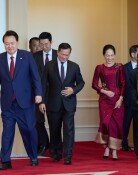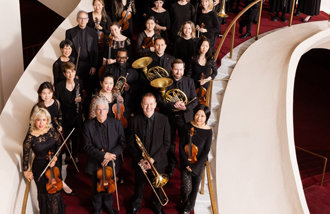Lees Diplomacy Should Start by Strengthening U.S.-Korea Alliance
Lees Diplomacy Should Start by Strengthening U.S.-Korea Alliance
Posted December. 22, 2007 05:41,
President-elect Lee Myung-bak has drawn attention and expectations from leaders of other major countries. U.S. president George W. Bush and Japanese Prime Minister Yasuo Fukuda gave a call to the president-elect, congratulating Lee on his victory, and Chinese President Hu Jintao and Russian President Vladimir Putin sent a letter to Lee to express their congratulations. The president-elect promised stronger diplomatic ties and close cooperation. The responses of the leaders of the U.S., Japan, China, and Russia show that they have not been satisfied with their relations with Korea for the past five years. Lee has to make good use of the fact that leaders of other nations have shown positive responses toward Koreas leadership change, as a steppingstone for maximizing the nations interest and diplomacy.
The Korea-US alliance is undoubtedly a major pillar of Koreas diplomacy. In a call, U.S. President Bush and South Korean President-elect Lee Myung-bak came to an understanding to end North Koreas nuclear program and promised close cooperation. In a response to Bushs saying, I will prioritize the U.S.-Korea relationship, Lee said Ill strengthen the ties between the two nations. It is also encouraging that Lee and Bush agreed to dispatch a delegation to each nation next month in order to discuss measures to deal with North Koreas nuclear issues and strengthen the alliance.
For the past few years, U.S.-Korea relations have been damaged by the fruitless independent, diplomatic stance of the Participatory Government. Against this backdrop, the president-elect needs to do his best to restore the damaged bilateral relations and set up trust between the two governments and leaders. Even though the Roh Moo-hyun administration made a hard decision to dispatch armies to Iraq and Afghanistan at the request of the U.S., it has not been welcomed that much by the U.S. government due to President Rohs frequent anti-U.S. statements and diplomatic stance provoking the U.S.. In other words, the Roh Moo-hyun administration has injured itself by failing to satisfy the U.S. despite its efforts to meet Americas demands.
Close cooperation between the U.S. and Korea is urgently needed in order to find measures to terminate the North Korean nuclear program and ratify a bilateral free trade agreement. For this to happen, Korea needs to express its opinions boldly while pursuing mutual values and benefits.
As President-elect Lee said to Japanese Prime Minister Fukuda, the tripartite cooperation of the U.S., Korea and Japan is very important in order to deal with the North Korean nuclear issue and stabilize the East Asia region. As seen in the MB Doctrine covering Lees foreign and security policies, Korea needs to expand its diplomacy to open an era of a greater Asia and build a so-called energy silk road (international energy cooperative belt). The launch of the Lee Myung-bak administration is a precious opportunity for Korea to start restoring U.S.-Korea relationship, and to expand its diplomatic efforts toward Japan, China, and Russia even further.







